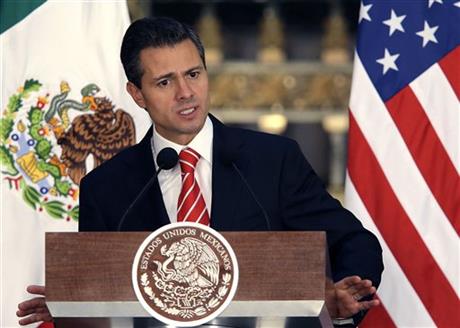
By OLGA R. RODRIGUEZ
FILE – In this May 2, 2013 file photo, Mexico’s President Enrique Pena Nieto speaks during a news conference in Mexico City, Mexico. Teachers’ protests that have snarled traffic, blocked government buildings and prompted the cancellation of sports events in Mexico City have prompted Pena Nieto to change the date of his state-of-the-union address that was scheduled for Sunday, Sept. 1, 2013. That’s the same day a dissident teachers’ union plans the latest in a series of protests against the president’s proposed education reform. (AP Photo/Dario Lopez-Mills, File)
MEXICO CITY (AP) — President Enrique Pena Nieto opened his first state-of-the-nation address Monday by praising the passage of a key education reform just hours earlier.
The House of Deputies voted in the middle of the night to approve mandatory teacher evaluations, despite teacher protests that have snarled Mexico City over the past week.
“This is an important and transcendental step,” he said. “Our dilemma had been whether to continue to stagnate or to allow the state to recover the leadership and transform and improve the quality of education.”
The Senate still needs to approve the bill, which calls for mandatory assessment of teachers to maintain their jobs and to receive promotions. Teachers can inherit their positions under the current system.
The bill approved by the House of Deputies is a slightly weakened version of Pena Nieto’s proposal, which sought to reassert government control over an education system where hiring and promotion was almost entirely in the hands of teachers’ unions.
The reform sets up a competitive examination system for hiring and requires teachers to pass regular evaluations in order to remain in the classroom.
But last-minute concessions to a dissident teachers’ union reserves new positions for graduates of union-controlled teacher training schools for the next two years and allows teachers who fail evaluations to file appeals through the existing civil service system.
The government proposal would have put the test-based hiring system in place immediately, and not allowed appeals after repeated failures of teacher evaluations.
Independent education advocates praised the passage of the proposal as a good first step after decades of union control of the schools, but said the measure didn’t go far enough to establish a rigorous nationwide system of teacher training and promotion.
They said they worried that further reforms could stall as the government pushes to change Mexico’s tax regime and allow private investment in the state oil company.
______
Associated Press writer Michael Weissenstein contributed to this report.



